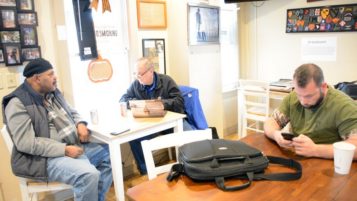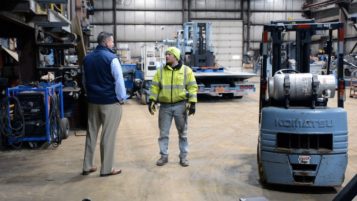
Veterans on your team are a great asset, but they don’t just appear
By: Julie Davis
In the construction industry, servant leadership, teamwork, communications, organizational and problem-solving skills, and the ability to handle high-pressure situations calmly are often considered top priorities in building a successful team. Construction supervisors would be hard-pressed to find a tighter grouping of those skills than in today’s U.S. military veterans. If you’re looking to add to your staff, here’s why veterans should be at the top of your list, how to recruit them and how to keep them once you have them.
“I kept my Humvee in Afghanistan running with a soda can and bailing wire. We had to improvise,” says Saul Newton, executive director of the Wisconsin Veterans Chamber of Commerce. “We had to find creative solutions just to make sure the task gets accomplished. That’s what you’re getting when you see someone with a military background.”
What’s in it for your company?
Many companies find veterans to be more productive employees with lower turnover rates when compared to their non-veteran counterparts. Their past military background can give veterans distinctive capabilities and perspectives that can add insight and diversity to your team’s problem solving and fill an immediate opening without needing further skills training.
Employers can also qualify for up to $10,000 in federal tax credits per veteran. However, you have to know how to find these men and women for your team.
“I’ll use myself as an example. I enlisted in the Army. I was an infantryman. My formal job duties, if you were to type in ’11B’ into an MOS [military occupational specialties] translator, it would come back and say this individual was trained to operate weapons systems, communicate and move tactically. How often do you think I am using those skills in my day-to-day job today?” Newton says. “If there’s a construction manager, or hiring manager, looking at an 11B, they would see someone who has supervised people before, someone who is able to work as part of a team, who can follow instruction, but also work independently and engage creative thinking skills.”
“I think if you took the word ‘veteran’ out of it, but you took somebody that had the soft skills, knew what they needed to do to show up daily, came prepared, understood direction, if you took those key things and said you wanted a candidate like that, I think everyone would be in agreement: Yes, that’s a very good candidate to get off the ground,” says Jason Young, a Marine and Army National Guard veteran and president of West Allis, Wisconsin-based Price Erecting. Young also serves on the board of the Wisconsin Veterans Chamber of Commerce where he helps other companies recruit and retain veterans.
Veterans think differently, so should you.
One thing both Newton and Young try to emphasize with companies, and the public in general, is how veterans come with a different mindset that allow them to focus on the task in front of them, and make them willing and able to work their way up from the bottom. However, one thing about that different mindset is it’s different from the way most private companies operate, and can make eminently qualified veterans difficult to recruit and retain.
“We worked with an individual who was retiring from the Army, and interviewed with a larger employer. The employer went with a different candidate because this individual answered every question in the interview with ‘we.’ ‘We’ did this. ‘We’ did that. Here’s what ‘we’ accomplished. The employer said they were looking for what that individual did,” Newton says. “That tells me that that particular employer has never spent a lot of time with anyone in the military because that’s not a semantic difference to us. That’s literally how our minds work.”
Trauma is a concern, not a disqualifier.
Another source of the different mindset can be the traumatic experiences and injuries that members of the military sometimes experience. According to the U.S. Department of Veterans Affairs, a small sub-section of veterans will experience symptoms of post-traumatic stress disorder at some point in their life. However, veterans’ groups insist that everyone who “signed their name” deserve a fulfilling career after they separate from the service, and they’re willing to assist companies in making their workplace “veteran ready” and “veteran friendly.”
“We do have individuals that have physical and mental disability. That’s not to say they can’t perform their work or perform what they do on a daily basis,” Young, of Price Erecting, says. “Their physical injuries, or mental injuries, are more a talking point to discuss further things that may be outside the workplace, maybe a family situation or something like that, versus something where they can’t perform what they do on a daily basis at work.”
DryHootch, Inc., a Milwaukee-based nonprofit dedicated to helping veterans transition from military life to civilian life through peer support is one of those organizations. With “forward operating bases” in Wisconsin, Illinois, Georgia and Alabama, DryHootch utilizes the power of peer support to help veterans, including those with severe mental and physical injury, make their return home.
“DryHootch did a lot for me. When I came here I was homeless,” says DryHootch Executive Director Otis Winstead, a Vietnam-era veteran who served in the Army domestically. “Through peer support, other veterans were able to put up a mirror so I could see myself, and see that I was worth something. That’s all through peer support. It’s all about one vet helping another vet, and that’s what we do every day.”
What should your strategy be?
Veteran’s groups say the best way to recruit and retain veterans is to utilize the veterans you already have. Introduce the veterans on your team to each other, invite local veterans’ organizations to help consult or create peer support groups, have one of your veteran team members on hand when interviewing a new veteran recruit and, most of all, respect them as the professionals they are. Through doing these things, your company will build a team of close-knit individuals, ready to deploy for your mission.
The Association of Equipment Manufacturers is committed to supporting members by providing ideas, sharing best practices and creating tools that support workforce solutions. For companies seeking veteran talent, good places to connect with include Heroes Make America, Hire Heroes USA, Bradley-Morris, Inc. and Orion Talent.
Julie Davis is the director of workforce development at the Association of Equipment Manufacturers, helping member organizations move to the next step in their workforce development journey.





 Join our thriving community of 70,000+ superintendents and trade professionals on LinkedIn!
Join our thriving community of 70,000+ superintendents and trade professionals on LinkedIn! Search our job board for your next opportunity, or post an opening within your company.
Search our job board for your next opportunity, or post an opening within your company. Subscribe to our monthly
Construction Superintendent eNewsletter and stay current.
Subscribe to our monthly
Construction Superintendent eNewsletter and stay current.